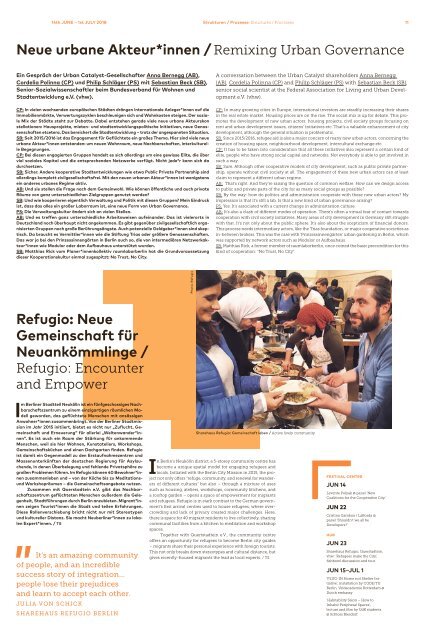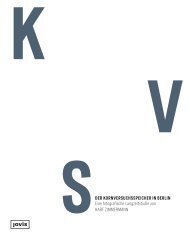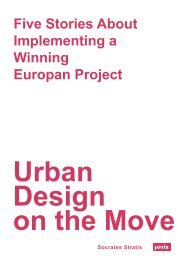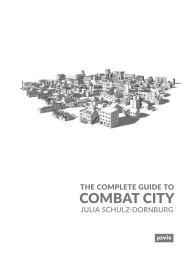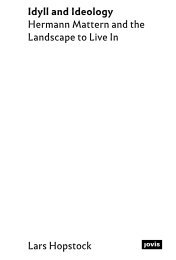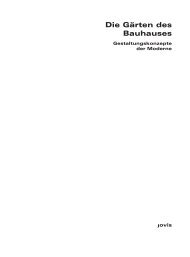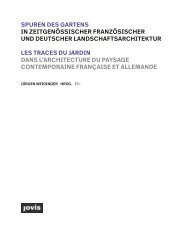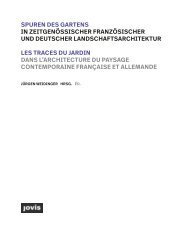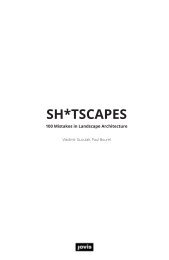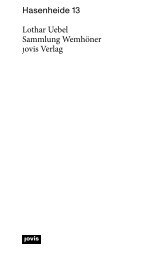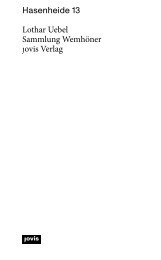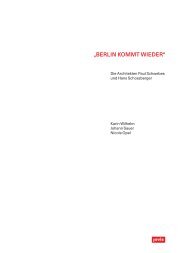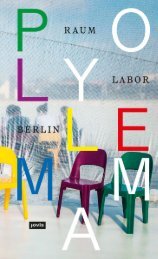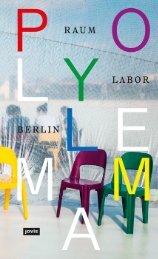Make City 2018 Festival - Newspaper
You also want an ePaper? Increase the reach of your titles
YUMPU automatically turns print PDFs into web optimized ePapers that Google loves.
14th JUNE – 1st JULY <strong>2018</strong><br />
Strukturen / Prozesse Structures / Processes<br />
11<br />
Neue urbane Akteur*innen / Remixing Urban Governance<br />
Ein Gespräch der Urban Catalyst-Gesellschafter Anna Bernegg (AB),<br />
Cordelia Polinna (CP) und Philip Schläger (PS) mit Sebastian Beck (SB),<br />
Senior-Sozialwissenschaftler beim Bundesverband für Wohnen und<br />
Stadtentwicklung e.V. (vhw).<br />
CP: In vielen wachsenden europäischen Städten drängen internationale Anleger*innen auf die<br />
Immobilienmärkte, Verwertungszyklen beschleunigen sich und Wohnkosten steigen. Der soziale<br />
Mix der Städte steht zur Debatte. Dabei entstehen gerade viele neue urbane Akteurskon<br />
stellationen: Hausprojekte, mieten- und stadtentwicklungspolitische Initiativen, neue Genossenschaften<br />
etcetera. Das bereichert die Stadtentwicklung – trotz der angespannten Situation.<br />
SB: Seit 2015/2016 ist das Engagement für Geflüchtete ein großes Thema. Hier sind viele neue<br />
urbane Akteur*innen entstanden: um neuen Wohnraum, neue Nachbarschaften, interkulturelle<br />
Begegnungen.<br />
CP: Bei diesen engagierten Gruppen handelt es sich allerdings um eine gewisse Elite, die über<br />
viel soziales Kapital und die entsprechenden Netzwerke verfügt. Nicht jede*r kann sich da<br />
durchsetzen.<br />
SB: Sicher. Andere kooperative Stadtentwicklungen wie etwa Public Private Partnership sind<br />
allerdings komplett zivilgesellschaftsfrei. Mit den neuen urbanen Akteur*innen ist wenigstens<br />
ein anderes urbanes Regime aktiv.<br />
AB: Und sie stellen die Frage nach dem Gemeinwohl. Wie können öffentliche und auch private<br />
Räume von ganz unterschiedlichen Zielgruppen genutzt werden?<br />
SB: Und wie kooperieren eigentlich Verwaltung und Politik mit diesen Gruppen? Mein Eindruck<br />
ist, dass das alles ein großer Laborraum ist, eine neue Form von Urban Governance.<br />
PS: Die Verwaltungskultur ändert sich an vielen Stellen.<br />
AB: Und es treffen ganz unterschiedliche Arbeitsweisen aufeinander. Das ist vielerorts in<br />
Deutschland noch überhaupt nicht angekommen. Es gibt gegenüber zivilgesellschaftlich organisierten<br />
Gruppen noch große Berührungsängste. Auch potenzielle Geldgeber*innen sind skeptisch.<br />
Da braucht es Vermittler*innen wie die Stiftung Trias oder größere Genossenschaften.<br />
Das war ja bei den Prinzessinnengärten in Berlin auch so, die von intermediären Netzwerkakteur*innen<br />
wie Modulor oder dem Aufbauhaus unterstützt wurden.<br />
SB: Matthias Rick vom Planer*innenkollektiv raumlaborberlin hat die Grundvoraussetzung<br />
dieser Kooperationskultur einmal zugespitzt: No Trust, No <strong>City</strong>.<br />
A conversation between the Urban Catalyst shareholders Anna Bernegg<br />
(AB), Cordelia Polinna (CP) and Philip Schläger (PS) with Sebastian Beck (SB),<br />
senior social scientist at the Federal Association for Living and Urban Development<br />
e.V. (vhw).<br />
CP: In many growing cities in Europe, international investors are steadily increasing their shares<br />
in the real estate market. Housing prices are on the rise. The social mix is up for debate. This promotes<br />
the development of new urban actors: housing projects, civil society groups focusing on<br />
rent and urban development issues, citizens‘ initiatives etc. That’s a valuable enhancement of city<br />
development, although the general situation is problematic.<br />
SB: Since 2015/2016, refugee aid is also a major concern of many new urban actors, concerning the<br />
creation of housing space, neighbourhood development, intercultural exchange etc.<br />
CP: It has to be taken into consideration that all these initiatives also represent a certain kind of<br />
elite, people who have strong social capital and networks. Not everybody is able to get involved in<br />
such a way.<br />
SB: Sure. Although other cooperative models of city development, such as public private partnership,<br />
operate without civil society at all. The engagement of these new urban actors can at least<br />
claim to represent a different urban regime.<br />
AB: That’s right. And they’re raising the question of common welfare. How can we design access<br />
to public and private parts of the city for as many social groups as possible?<br />
SB: By the way: how do politics and administration cooperate with these new urban actors? My<br />
impression is that it’s still a lab. Is that a new kind of urban governance arising?<br />
PS: Yes. It’s associated with a current change in administration culture.<br />
AB: It’s also a clash of different modes of operation. There’s often a virtual fear of contact towards<br />
cooperation with civil society initiatives. Many areas of city development in Germany still struggle<br />
with that. It’s not only about the public sphere. It’s also about the scepticism of financial donors.<br />
This process needs intermediary actors, like the Trias foundation, or major cooperative societies as<br />
in-between brokers. This was the case with ‘Prinzessinnengärten’ urban gardening in Berlin, which<br />
was supported by network actors such as Modulor or Aufbauhaus.<br />
SB: Matthias Rick, a former member of raumlaborberlin, once coined the basic precondition for this<br />
kind of cooperation: “No Trust, No <strong>City</strong>”.<br />
Photo: Refugio<br />
Refugio: Neue<br />
Gemeinschaft für<br />
Neuankömmlinge /<br />
Refugio: Encounter<br />
and Empower<br />
Im Berliner Stadtteil Neukölln ist ein fünfgeschossiges Nachbarschaftszentrum<br />
zu einem einzigartigen räumlichen Modell<br />
geworden, das geflüchtete Menschen mit ansässigen<br />
Anwohner*innen zusammenbringt. Von der Berliner Stadtmission<br />
im Jahr 2015 initiiert, bietet es nicht nur „Zuflucht, Gemeinschaft<br />
und Erneuerung“ für allerlei „Weltenwander*innen“.<br />
Es ist auch ein Raum der Stärkung für ankommende<br />
Menschen, weil sie hier Wohnen, Kunstateliers, Workshops,<br />
Gemeinschaftsküchen und einen Dachgarten finden. Refugio<br />
ist damit ein Gegenmodell zu den Erstaufnahmezentren und<br />
Massenunterkünften der deutschen Regierung für Asylsuchende,<br />
in denen Überbelegung und fehlende Privatsphäre zu<br />
großen Problemen führen. Im Refugio können 40 Bewohner*innen<br />
zusammenleben und – von der Küche bis zu Meditationsund<br />
Workshopräumen – die Gemeinschaftsangebote nutzen.<br />
Zusammen mit Querstadtein e.V. gibt das Nachbarschaftszentrum<br />
geflüchteten Menschen außerdem die Gelegenheit,<br />
Stadtführungen durch Berlin anzubieten. Migrant*innen<br />
zeigen Tourist*innen die Stadt und teilen Erfahrungen.<br />
Diese Rollenverschiebung bricht nicht nur mit Stereotypen<br />
und kultureller Distanz. Sie macht Neuberliner*innen zu lokalen<br />
Expert*innen. / TS<br />
It‘s an amazing community<br />
of people, and an incredible<br />
success story of integration…<br />
people lose their prejudices<br />
and learn to accept each other.<br />
JULIA VON SCHICK<br />
SHAREHAUS REFUGIO BERLIN<br />
Sharehaus Refugio: Gemeinschaft leben / Active lively community<br />
In Berlin’s Neukölln district, a 5-storey community centre has<br />
become a unique spatial model for engaging refugees and<br />
locals. Initiated with the Berlin <strong>City</strong> Mission in 2015, the project<br />
not only offers “refuge, community, and renewal for wanderers<br />
of different cultures” but also – through a mixture of uses<br />
such as housing, ateliers, workshops, community kitchens, and<br />
a rooftop garden – opens a space of empowerment for migrants<br />
and refugees. Refugio is in stark contrast to the German government’s<br />
first arrival centres used to house refugees, where overcrowding<br />
and lack of privacy created major challenges. Here,<br />
there is space for 40 migrant residents to live collectively, sharing<br />
communal facilities from a kitchen to meditation and workshop<br />
spaces.<br />
Together with Quertstadtein e.V., the community centre<br />
offers an opportunity for refugees to become Berlin city guides<br />
– migrants share their personal experience with foreign tourists.<br />
This not only breaks down stereotypes and cultural distance, but<br />
gives recently-housed migrants the lead as local experts. / TS<br />
FESTIVAL CENTRE<br />
JUN 14<br />
Levente Polyak @ panel ‘New<br />
Coalitions for the Cooperative <strong>City</strong>’<br />
JUN 22<br />
Cristina Gamboa / LaBorda @<br />
panel ‘Shouldn’t we all be<br />
Developers?’<br />
HUB<br />
JUN 23<br />
Sharehaus Refugio, Querstadtein,<br />
vhw: ‘Refugees make the <strong>City</strong>’,<br />
fishbowl discussion and tour<br />
JUN 15–JUL 1<br />
‘PLUG-IN Home not Shelter Initiative’,<br />
installation by CODE/TU<br />
Berlin, Veldacademie Rotterdam @<br />
Dutch embassy<br />
‘Habitability Salon – How to<br />
Inhabit Peripheral Spaces’,<br />
lecture and film by UdK students<br />
@ Schloss Biesdorf


